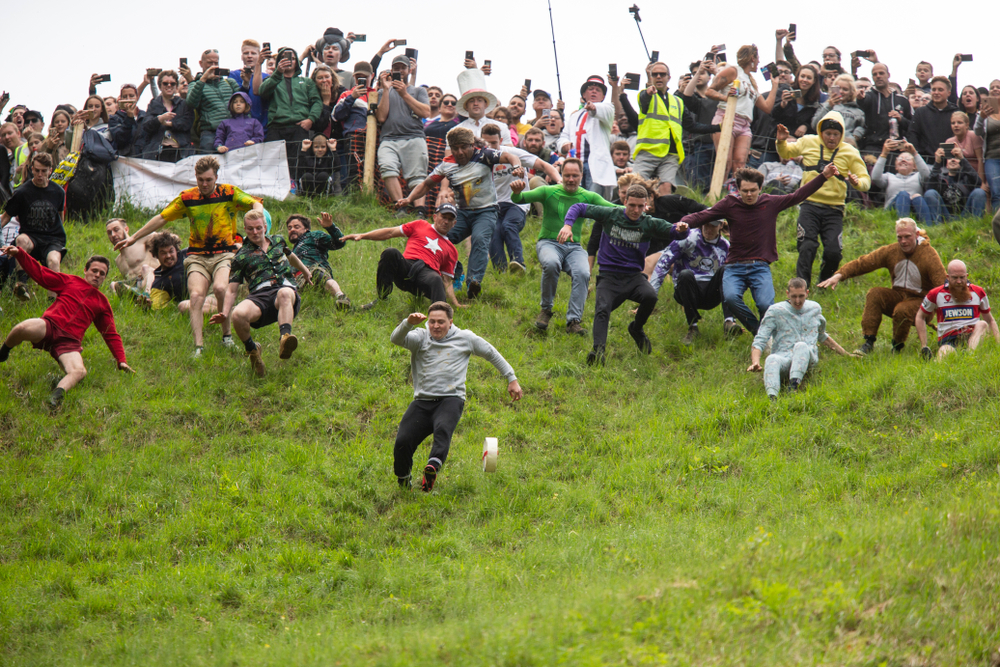Introduction
Sports are a vibrant thread that unites communities and creates a shared narrative of passion and competition within the rich tapestry of culture. However, beyond the well-traveled paths of well-known laws and customs, there is a world of eccentricity and enthralling traditions that give sporting events all over the world a distinctive and unforgettable flair. These unusual customs demonstrate the variety of ways in which people express their love of play, ranging from charming rituals that trace back to centuries-old legends to downright strange behaviors that defy reason. In addition to providing entertainment outside of the playing field, they turn into cultural icons that embody the essence of a community’s identity. This investigation into the realm of peculiar sports customs reveals the extraordinary within the ordinary, demonstrating that play has no boundaries and can take on delightfully unexpected forms all over the world.
- The Cooper’s Hill Cheese Rolling (England)
A spectacle that defies gravity and reason, the Cooper’s Hill Cheese Rolling event takes place in the picturesque hills of Gloucestershire, England. As a wheel of Double Gloucester cheese hurtles down a steep hill, participants eagerly chase after it. The drawback? The race to the bottom is chaotic and exhilarating because the hill is so steep that competitors frequently end up falling head over heels. The event has become a symbol of English eccentricity, drawing competitors and spectators from all over the world for the chance to win the coveted cheese wheel.

- Wife Carrying Championship (Finland)
During the annual Wife Carrying Championship, love takes on an unusual form in the charming Finnish village of Sonkajärvi. Competitors carry their wives—yes, you read that right—on their backs as they maneuver through a difficult obstacle course. The strange custom dates back to a story about a well-known Finnish thief who allegedly used this peculiar test to screen prospective recruits. Couples from all over the world come to the championship these days to compete for the grand prize, which is usually the wife’s weight in beer.
- Buzkashi (Central Asia)
Move over, conventional team sports; Buzkashi is an equestrian game that takes competition to a whole new level. Popular in Central Asia, particularly in Afghanistan, Kyrgyzstan, and Tajikistan, Buzkashi involves horse-mounted players aiming to grab and carry a goat or calf carcass across a goal line. The intensity and physicality of the game make it a riveting spectacle, and the traditions associated with Buzkashi, including the ceremonial clothing and rituals, highlight its significance as a cultural phenomenon deeply embedded in the region’s history.
- Sepak Takraw (Southeast Asia)
Sepak Takraw is a sport that combines elements of soccer, volleyball, and martial arts and requires quick reflexes and acrobatic skill. This game, which has its origins in Southeast Asia, specifically in Malaysia, Thailand, and Indonesia, involves players using their feet, knees, chests, and heads to propel a small rattan ball over a net. With international competitions showcasing the captivating agility of its players, the sport has developed a devoted following in the region thanks to its unique blend of athleticism and finesse.
- Underwater Hockey (Various Countries)
Although hockey is usually connected with ice or fields, some fans have literally elevated the game to new heights. Played at the bottom of a swimming pool, underwater hockey is a team sport where two teams compete to move a puck into the goal of the other team using snorkels, fins, and small sticks. The sport, which began in England in the 1950s, has become popular all over the world, drawing participants who enjoy the challenge of breath-holding and deft maneuvering in a completely aquatic environment.
- Hurling (Ireland)
Ireland’s national sport, hurling, combines speed, skill, and ancient tradition in a captivating way. A small ball and a wooden stick known as a hurley are used in this game, in which two teams compete to score points by hitting the ball into the goal of the other team. Hurling is unique because of its enduring ties to Irish mythology and folklore. With ardent supporters and a distinctive sporting environment that captures the essence of the Emerald Isle, the sport is more than just a game. It is a reflection of Ireland’s cultural identity.

- Yabusame (Japan)
Yabusame, a kind of traditional Japanese equestrian archery, is an impressive demonstration of dexterity and skill. This sport, which has its roots in samurai culture, sees mounted archers charging at great speeds while aiming their arrows at a set of targets. Yabusame is a ritual that symbolizes discipline and the warrior spirit in addition to being a test of marksmanship. Yabusame’s rituals and costumes demonstrate a profound regard for custom, making the sport a living link to Japan’s extensive historical legacy.
- Elephant Polo (Nepal, Thailand, and Sri Lanka)
Polo, albeit with pachyderms? Elephant Polo is a sport that combines the elegance of polo with the breathtaking spectacle of these magnificent creatures in the lush landscapes of Nepal, Thailand, and Sri Lanka. Teams of four compete to score goals with a giant ball and mallets. Each team consists of a player and a mahout (elephant driver). Elephant Polo is a distinctive and remarkable sporting event due to its blend of athleticism, strategy, and the sheer novelty of witnessing elephants gracefully maneuver on the field.
Conclusion
The investigation of these unusual sports customs is a moving reminder that sports are much more than just arenas of competition. They become vibrant celebrations of history, culture, and the human spirit that never dies. Every oddball custom, whether it originates from pure invention or folklore, adds a rich dimension to the complex fabric of international sports. The oddities displayed in activities such as elephant polo and cheese rolling reveal the richness of human creativity and the capacity of communities to imbue play with cultural meaning. These customs represent a shared happiness and a spirit of community that knows no boundaries; they are not just about winning or losing. A universal truth can be found among these incredibly strange manifestations: the love of competition is a flexible and unifying force that can appear everywhere in the world in a variety of surprising ways. In all of their quirks, sports serve as a monument to the infinite variety of human expression.

